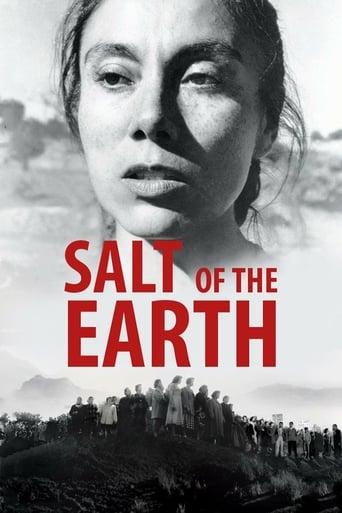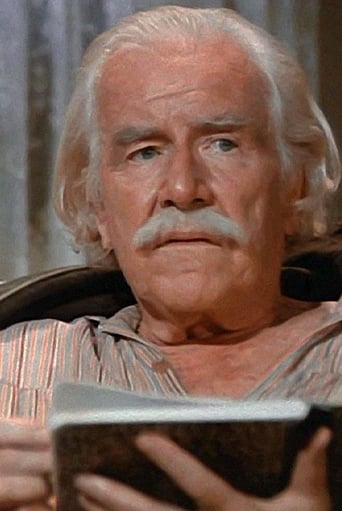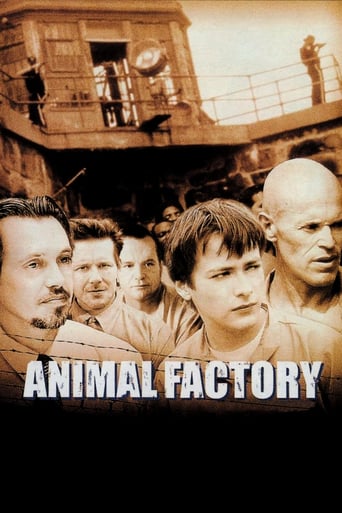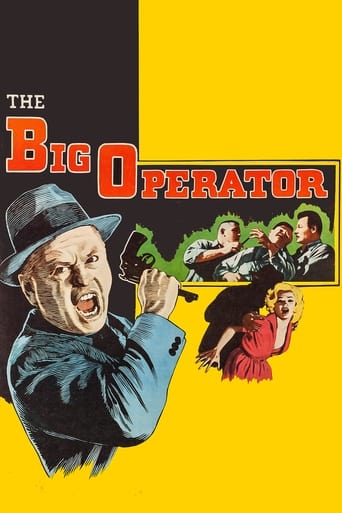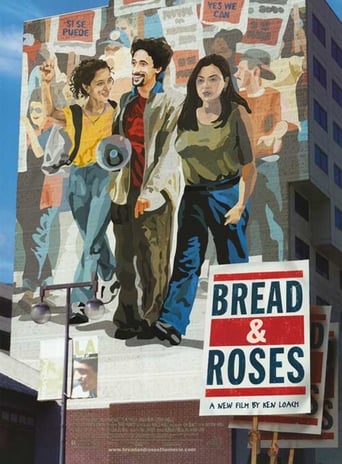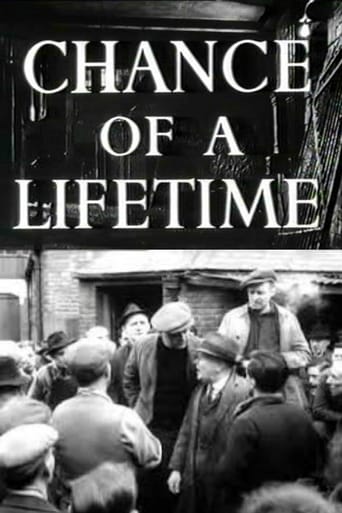Salt of the Earth (1954)
At New Mexico's Empire Zinc mine, Mexican-American workers protest the unsafe work conditions and unequal wages compared to their Anglo counterparts. Ramon Quintero helps organize the strike, but he is shown to be a hypocrite by treating his pregnant wife, Esperanza, with a similar unfairness. When an injunction stops the men from protesting, however, the gender roles are reversed, and women find themselves on the picket lines while the men stay at home.
Watch Trailer
Free Trial Channels
Cast


Similar titles
Reviews
Yawn. Poorly Filmed Snooze Fest.
Self-important, over-dramatic, uninspired.
This film is so real. It treats its characters with so much care and sensitivity.
A clunky actioner with a handful of cool moments.
I'm so glad I saw this film! It shows the power of solidarity - people of all backgrounds, gender, and whatever other category might otherwise be used to separate them, uniting together to gain the power and dignity they deserve as human beings. It took some of them a while to learn, but the common struggle tears down walls. Rise up, and push everyone else up with you!
The propagation of fear of the "other", or the unknown, is a fervent device used by governments for the control of the masses (the population). In the 1940's and 1950's in the west (particularly the United States - and to a lesser extent the UK), the common object of fear was the spread of Communism. In 1947, this paranoia about the infiltration of socialist ideologies into US politics, culminated in the organisation of HUAC (House Un-American Activities Committee), which began a witch hunt for any persons involving themselves (allegedly) in Communist politics and ideas. Propaganda was in full swing by 1954, and the hunt was extended into the arts, particularly Hollywood - with its "Harbouring" of socialism - which led to the imprisonment of "The Hollywood Ten" which included the writers and filmmakers involved in the making of Salt of the Earth - which was inevitably blacklisted.With a largely non-professional cast (only five were professionals), this neo-realist style film tells the story - based on real events - of a workers strike for equality of pay and conditions for American- Mexicans working in the Delaware Zinc mines in New Mexico. Told from the perspective of Esperanza Quintero (Rosaura Revueltas - one of the five actual actors), the film opens with a domestic scene and her narration, as she outlines their social conditions, and the small community. Her husband, Ramon (incredibly heartfelt performance by non-professional, Juan Chacon), signifies the "traditional" male, whose displays a reluctance for his wife to involve herself with nothing but the upkeep of the home, and the raising of their children (not a particularly revelatory experience in the 1950's).After the failure of the men - bound by union restrictions - to successfully picket the mine, the women of the village take their places, creating a barrier to the entrance. This destabilises the workers union to begin with, and fundamentally disrupts the home life of Ramon and Esperanza - whose conventional roles are reversed, creating an emasculated man-of-the-house. The reactions of the mining management/owners leads to the arrest of all the women, which creates an even greater sense of solidarity between the women, and eventually (once they realise the importance of this strike) the men.Within the context of this film, it is hard to believe in this day that this film (which perpetuates socialist ideas - Communist theories) was regarded as dangerous to the point of being blacklisted. However, what this part of history highlights is that these political ideas are simply dangerous to a hegemony of market power. That is, the fear of Communism (or socialism) is simply that it would - in theory - give equal rights and fair wages to the workers of any company or corporation. Of course, if socialism did spread, this would mean the obliteration of the free market economy that has so far simply created a greater divide of rich and poor in the West, and ultimately led to such incredible greed, and intrinsically creating the banking crisis of 2008.With a strong cast of actors and locals, this film is both enlightening and emotionally mature. It is itself a piece of pure propaganda, but it skillfully emphasises the socialist ideal of equality. The film also raises some interesting feminist questions - a movement that didn't really become part of popular culture until the late '60's and '70's - and gravitates towards alternative social roles for women. It was of course ignored by the Hollywood system, but eventually found audiences within film schools and workers unions. A common reaction was astounding: The Hollywood Reporter (a trade magazine) made a bold and frivolous statement claiming that the film was made under the direct orders of the Kremlin. It is an incredibly important piece of social history, that is also successful as an interesting and entertaining slice of cinema.www.the-wrath-of-blog.blogspot.com
The Salt of the Earth, which came out in 1954 paints an almost too real picture of how migrant workers were treated before the civil rights movement. It is easy to see why the United States government, which was going through "The Red Scare" during this time, blacklisted this film. The film touches on and provokes many issues that were very sensitive during this era. Issues such as racism, equality, and feminism are the key themes in the movie. Racism was still very apparent in the United States during the 1950's, namely because the civil rights movement had not happened yet. The film pits the whites or "Anglos" against the Mexican workers. However, not all the whites in the film are depicted as evil. There are a few Caucasian workers who side themselves with the Mexicans. This gives the film a much more "real" atmosphere to it because it doesn't allude to one race being good and the other evil. Instead of simply having the whites be the antagonist, the film sets the leader of the mining company up to be the antagonist. Despite having a few whites on the side of the Mexican workers the film clearly sympathizes with the Mexicans. The film controls the in a way so the audience will undoubtedly root with the workers. The Mexican workers have poor safety requirements, which constantly lead to accidents on the site. This is all so the company can save money. When the Mexicans complain of this they are threatened with being replaced with an American worker by the foreman. The film does a good job of painting the leaders of the mining company as evil. There is a scene in the beginning where the foreman tells the workers to get back to work right after one of the workers is nearly killed in an explosion. This shows that the leaders have no compassion for the workers and that they are only in the business for the money with no care of the well being of the Mexicans. Also, the scene where they capture Ramon Quintero and beat him is very powerful and really makes you sympathize with that character. Another issue the film tries to push is feminism. The film starts off early with the Mexican workers acting very sexist toward their wives. Ramon is very controlling of his wife, Esperanza. There is an early scene where Ramon tells Esperanza to stop crying and wasting her time listening to the radio. This scene alone sets up the fact that sexism is an issue in this town. Another scene that depicts this fact is when all the women are trying to convince Esperanza to take part in a picket line. One of the wives complains that she works very hard and is still treated as though she is useless by her husband. However, once the men are not allowed to take part in the picket line the women become very involved. The men begin to understand that the wives can help with the strike. The film came out in 1954. The United States was in a false sense of calm during this time. The economy was booming. This lead to the growth of materialism and the country was becoming vastly capitalist. With the exception of the cold war and the communist scare the country was going through a very calm time. Salt of the Earth acts as a sort of a wake up call. It pushes all of these unseen issues to the light so people can become aware that there are still injustices going on inside the country. The main point of the film is equality. The film's conflict is a struggle for the races and sexes to become equal in the eyes of the government. Salt of the Earth was clearly ahead of it's time.
My interest in this movie was due to the negative reaction that it received when it was first released. In the interest of full disclosure, I am not in favor of compulsory union membership. I strongly believe that union membership should be entirely voluntary, and members should be able to keep the union from using their dues for political causes that the members do not support. That being said, I found this movie very entertaining and inspiring. These were people whose entire lives were dependent on the mine and their ability to earn a decent wage. They were totally invested in the union and had to live with the consequences, good or bad, of their actions. The women were as invested in the mine and the union as were their husbands, even though they were not actually employed by the mine or members of the union. The actions of these women were truly inspiring. But I did notice three areas which I think make the union portrayed in this movie completely different from today's unions: 1. The union leaders put up with the same hardships as the rank and file. Their jobs were on the line and they also suffered from not being paid, and were just as dependent on the donations from others outside of their union. 2. The union members (and eventually the wives as well) were free to vote their consciences with respect to all actions proposed by the union. There did not appear to be anyone who was trying to bully or unduly influence the other members to vote a particular way. 3. There were no politicians (local or from Washington) involved in the strike. There were no congressional hearings or big union bosses trying to influence the strike. Other than the donations of food and other necessities from other sympathetic unions, the mine workers were on their own.

